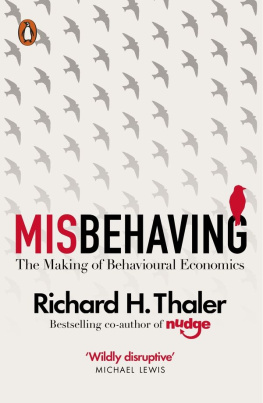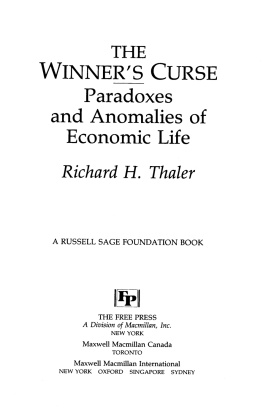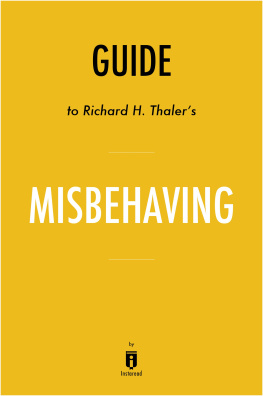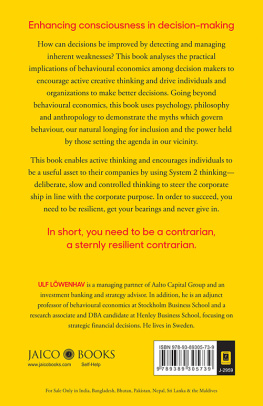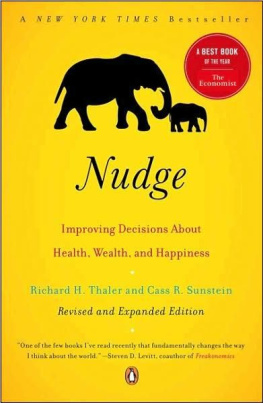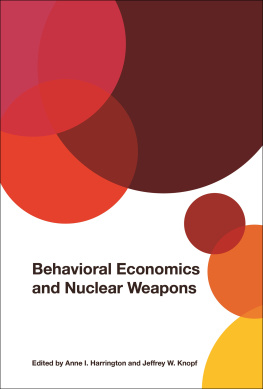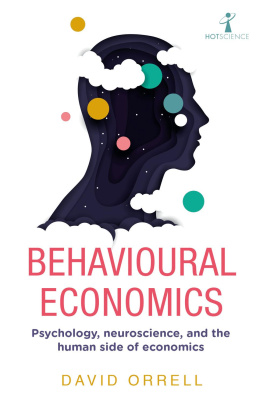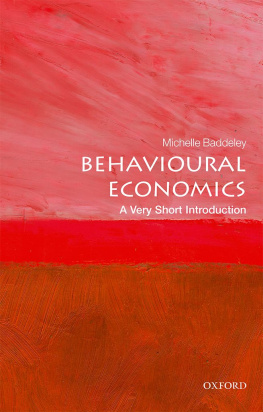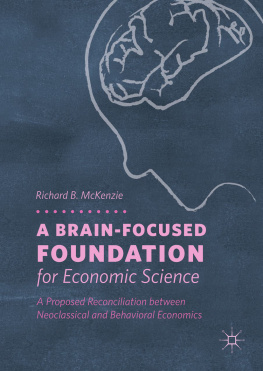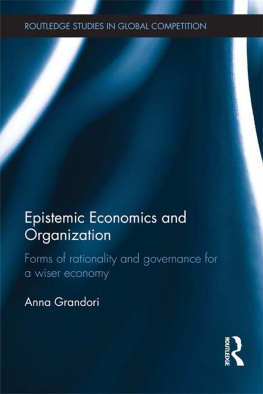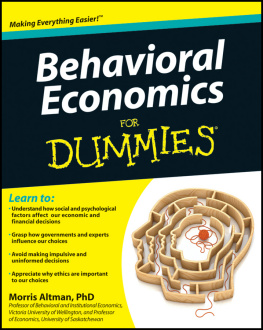Richard H. Thaler
MISBEHAVING
How Economics Became Behavioural
Contents
BY THE SAME AUTHOR
Quasi-Rational Economics
The Winners Curse: Paradoxes and Anomalies of Economic Life
Nudge: Improving Decisions About Health, Wealth, and Happiness
(with Cass R. Sunstein)
To:
Victor Fuchs who gave me a year to think, and Eric Wanner and the Russell Sage Foundation who backed a crazy idea
And to:
Colin Camerer and George Loewenstein, early students of misbehaving
and, in general, of every social science, is evidently psychology. A day may come when we shall be able to deduce the laws of social science from the principles of psychology.
VILFREDO PARETO , 1906
Preface
Before we get started, here are two stories about my friends and mentors, Amos Tversky and Daniel Kahneman. The stories provide some hints about what to expect in this book.
Striving to please Amos
Even for those of us who cant remember where we last put our keys, life offers indelible moments. Some are public events. If you are as old as I am, one may be the day John F. Kennedy was assassinated (freshman in college, playing pickup basketball in the college gym). For anyone old enough to be reading this book, September 11, 2001, is another (just getting up, listening to NPR, trying to make sense of it).
Other events are personal: from weddings to a hole in one. For me one such event was a phone call from Danny Kahneman. Although we speak often, and there are hundreds of calls that have left no trace, for this one I know precisely where I was standing. It was early 1996 and Danny had called to share the news that his friend and collaborator Amos Tversky was ill with terminal cancer and had about six months to live. I was so discombobulated that I had to hand the phone to my wife while I recovered my composure. The news that any good friend is dying is shocking, but Amos Tversky was just not the sort of person who dies at age fifty-nine. Amos, whose papers and talks were precise and perfect, and on whose desk sat only a pad and pencil, lined up in parallel, did not just die.
Amos kept the news quiet until he was no longer able to go into the office. Prior to that, only a small group knew, including two of my close friends. We were not allowed to share our knowledge with anyone except our spouses, so we took turns consoling one another for the five months that we kept this awful news to ourselves.
. Mostly Amos wanted to do the things he loved: working, spending time with his family, and watching basketball. During this period Amos did not encourage visitors wishing to express their condolences, but working visits were allowed, so I went to see him about six weeks before he died, under the thin disguise of finishing a paper we had been working on. We spent some time on that paper and then watched a National Basketball Association (NBA) playoff game.
Amos was wise in nearly every aspect of his life, and that included dealing with illness. After consulting with specialists at Stanford about his prognosis, he decided that ruining his final months with pointless treatments that would make him very sick and at best extend his life by a few weeks was not a tempting option. His sharp wit remained. He explained to his oncologist that cancer is not a zero-sum game. What is bad for the tumor is not necessarily good for me. One day on a phone call I asked him how he was feeling. He said, You know, its funny. When you have the flu you feel like you are going to die, but when you are dying, most of the time you feel just fine.
Amos died in June and the funeral was in Palo Alto, California, where he and his family lived. Amoss son Oren gave a short speech at the service and quoted from a note that Amos had written to him days before he died:
I feel that in the last few days we have been exchanging anecdotes and stories with the intention that they will be remembered, at least for a while. I think there is a long Jewish tradition that history and wisdom are being transmitted from one generation to another not through lectures and history books, but through anecdotes, funny stories, and appropriate jokes.
After the funeral, the Tverskys hosted a traditional shiva gathering at their home. It was a Sunday afternoon. At some point a few of us drifted into the TV room to catch the end of an NBA playoff game. We felt a bit sheepish, but then Amoss son Tal volunteered: If Amos were here, he would have voted for taping the funeral and watching the game.
From the time I first met Amos in 1977, I applied an unofficial test to every paper I wrote. Would Amos approve? My friend Eric Johnson, whom you will meet later on, can attest that one paper we wrote together took three years to get published after it had been accepted by a journal. The editor, the referees, and Eric were all happy with the paper, but Amos was hung up on one point and I wanted to meet his objection. I kept plugging away at that paper, while poor Eric was coming up for promotion without that paper on his vita. Fortunately Eric had written plenty of other strong papers, so my stalling did not cost him tenure. In time, Amos was satisfied.
In writing this book I took Amoss note to Oren seriously. The book is not the sort you might expect an economics professor to write. It is neither a treatise nor a polemic. Of course there will be discussions of research, but there will also be anecdotes, (possibly) funny stories, and even the odd joke.
Danny on my best qualities
One day in early 2001, I was visiting Danny Kahneman at his home in Berkeley. We were in his living room schmoozing, as we often do. Then Danny suddenly remembered he had an appointment for a telephone call with Roger Lowenstein, a journalist who was writing an , among others, naturally wanted to talk to my old friend Danny. Here was a quandary. Should I leave the room, or listen in? Stay, Danny said, this could be fun.
The interview started. Hearing a friend tell an old story about you is not an exciting activity, and hearing someone praise you is always awkward. I picked up something to read and my attention drifted until I heard Danny say: Oh, the best thing about Thaler, what really makes him special, is that he is lazy.
What? Really? I would never deny being lazy, but did Danny think that my laziness was my single best quality? I started waving my hands and shaking my head madly but Danny continued, extolling the virtues of my sloth. To this day, Danny insists it was a high compliment. My laziness, he claims, means I only work on questions that are intriguing enough to overcome this default tendency of avoiding work. Only Danny could turn my laziness into an asset.
But there you have it. Before reading further you should bear in mind that this book has been written by a certifiably lazy man. The upside is that, according to Danny, I will only include things that are interesting, at least to me.
I.
BEGINNINGS
197078
1
Supposedly Irrelevant Factors
Early in my teaching career I managed to inadvertently get most of the students in my microeconomics class mad at me, and for once, it had nothing to do with anything I said in class. The problem was caused by a midterm exam.

